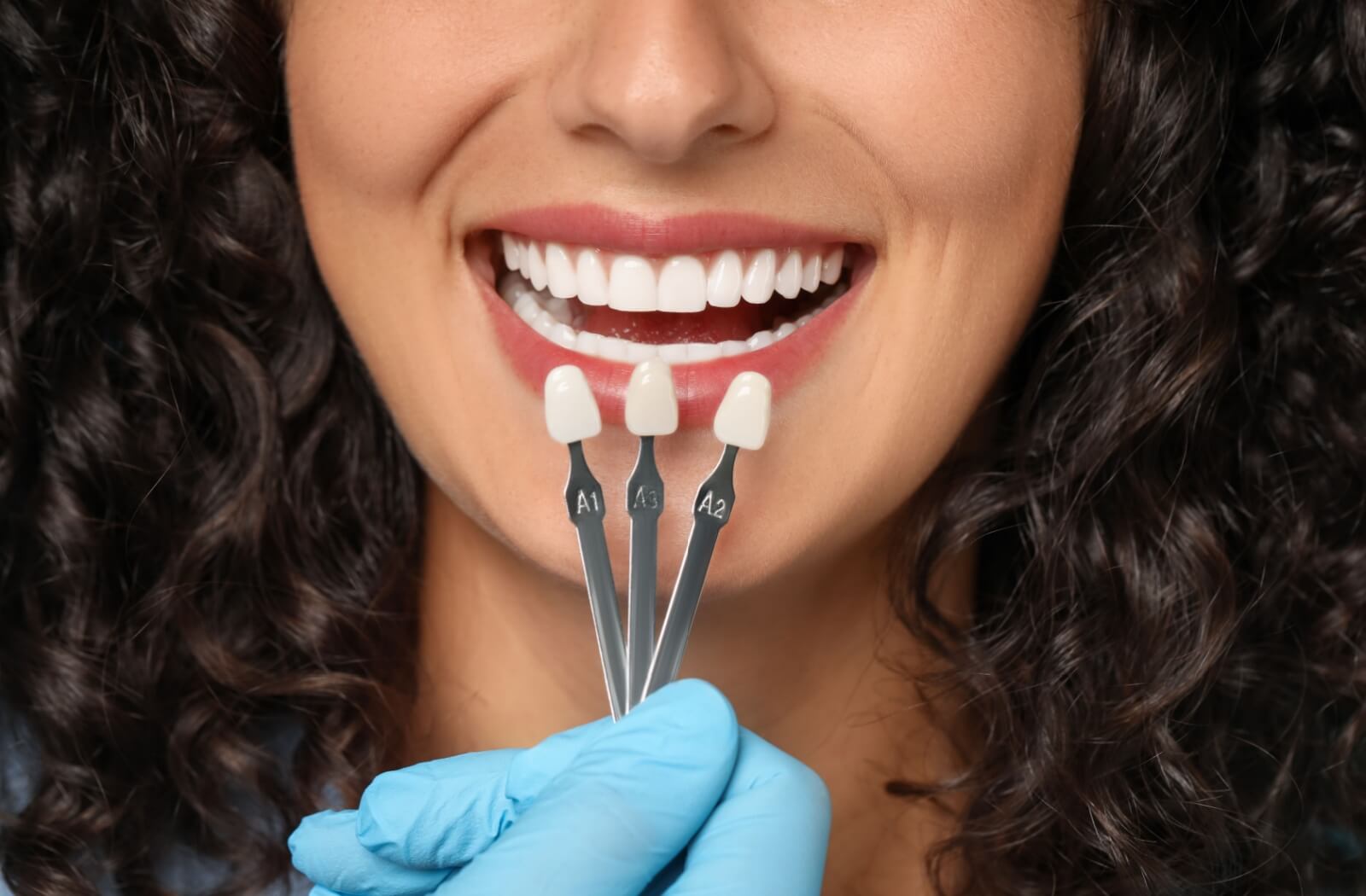If you want a more vibrant and sparkling smile, you may be considering cosmetic dentistry choices like teeth whitening or veneers. But many people wonder if veneers, like natural teeth, stain.
Natural teeth often get stained from food, drink, and tobacco. Whether veneers stain largely depends on the material they’re made from. Porcelain veneers do not stain or change colour, so they can stay untarnished and white for a long time.

What Are Veneers?
Veneers are thin shells made of porcelain or composite resin that are bonded to your teeth’s front surface. They can conceal perceived defects or imperfections, making them a cosmetic dentistry option that can improve the appearance of a person’s smile.
Reasons to Use Veneers
There are many benefits to using veneers. Here are some reasons why someone would choose veneers:
- Chipped or broken teeth: Chipped teeth are not uncommon, and these imperfections can be covered up by veneers.
- Small teeth: Some people do not like the appearance of smaller-than-usual teeth. If your teeth are naturally small, veneers can make them look proportionate to your other teeth.
- Teeth of unusual shapes: Since veneers are shells that attach to the front of teeth, they can mask unusual tooth shapes if you want your teeth to look more uniform.
- Discolouration: If your teeth are stained, unevenly coloured, or discoloured, and whitening doesn’t fix the problem, veneers can effectively hide the discolouration.
- Spacing imperfections: If you have gaps or unusual spacing between your teeth, veneers can help balance the look of your smile.
Types of Veneers
If you choose to get veneers, you have two general choices: porcelain or composite resin. They each have their pros and cons.
Porcelain Veneers
In general, porcelain veneers are stronger and last longer than composite resin veneers. They also do not stain or change colour, but they typically require at least 2 visits to the dentist to apply.
Composite Resin Veneers
Composite resin veneers typically cost less and are easier to apply. They can cover up cosmetic imperfections, but the material isn’t as strong as porcelain. This means they can chip and require replacement.
How Veneers Are Done
Veneers can be applied in just two dental visits.
Porcelain Veneers
Porcelain veneers may take more than one visit. First, you will be given a local anesthetic as your dentist removes a thin layer of enamel from your teeth. Next, your dentist will make a 3-D mould of your teeth—this is used to customize a set of veneers for you. As you wait for these veneers to be made, your dentist may give you a set of temporary veneers.
When your porcelain veneers are ready, your dentist will remove the temporary veneers and place a mild chemical on your teeth that roughens their surface. This helps the porcelain veneers stick to your teeth when your dentist glues them on with composite resin cement.

Composite Resin Veneers
Composite resin veneers can be applied all in one session with your dentist. First, your dentist will apply a mild chemical to the surface of your tooth. This roughens the tooth’s surface, allowing the veneer to stick on more easily.
Then, your dentist will choose a composite resin that matches the colour of your teeth. They will apply the composite resin veneer in layers, using a bright light to harden each layer. Finally, after these layers harden, your dentist will further shape and polish the tooth to help it blend in to your natural set of teeth.
Caring for Veneers
Veneers still require dental care like regular brushing, flossing, and professional cleaning at the dentist’s office. Be aware that stains and cavities can still happen underneath the veneer if it isn’t sealed properly.
It’s important to remember that veneers are not reversible because part of your enamel was removed to apply the veneer. Therefore, you should discuss with your dentist how to best care for your veneers.
Veneer Precautions
One of the main advantages of porcelain veneers is their stain resistance, but it’s still a good idea to avoid dark food and drinks such as coffee and tea, wine, and berries. These foods can stain veneers over time.
Avoid biting into hard, crunchy foods (such as apples). To help make your veneers last longer, cut up hard foods and chew them with your back teeth.
Try not to use whitening products. These can scratch your veneers.
Ask About Veneers at de Man & Hödiono Dentistry
Veneers can be a great way to brighten up your smile, but they’re a permanent application and require commitment.
If you’re interested in veneers, make sure to talk to us at de Man & Höediono Dentistry. We’ll examine your teeth and help you find a cosmetic solution that aligns with your needs. We also offer other cosmetic dentistry services such as porcelain onlays and inlays and orthodontics.
Contact us today to book an appointment!